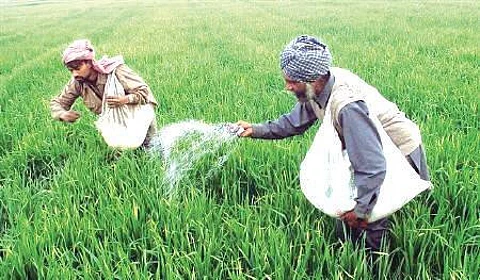

THIRUVANANTHAPURAM: Another long-term health hazard is in the offing as farmers have resorted to dump tonnes of weedicides in the paddy fields across the state anticipating acute labour shortage in the forthcoming farming season. Normally, the pre-monsoon showers used to turn the barren harvested paddy fields across the state into a green paradise when it rains. Now the greenish paddy fields are dotted with yellow patches everywhere when farmers turned to the cheap alternative of weedicide to manpower.
Shibu K, (name changed), 46-year-old farmer who cultivates around 15 acres of paddy on lease in Thrissur, said he has applied the weedicide named 'Cheap Power' 2.5 litre per acre in the paddyfields. It costs him around Rs 2,000 per acre, including the labour cost. Normally, around 10-15 labour days are
required to prepare the field before the farming season begins. If he employs labour, it will cost him around Rs 10,000-12,000. But if weedicides are applied, the labour charge would be minimal as there would not be any weed menace when farming begins after the monsoon.
"Even during the just concluded harvest season, the manpower shortage was acute. So there is no point in thinking that the workers would be coming back to the state before the next season, at this point of time. We are not sure that we would be able to hold replanting of paddy sapling. So applying weedicide
would not only save the cost but also help the farmer prepare the paddyfield without looking for abourers," he said.
This is not a matter that is just confined to one or two farmers. Over the years, there has been a steady increase in the consumption of weedicides in the state as farmers started to use weedicide as cheap alternative to manpower. Now this has reached a feverish pitch as migrant labourers started to go back to
their states, said Mathew Samuel, a pesticide dealer in Irinjalakuda.
P Indira Devi, agri-economist and former director of research, Kerala Agriculture University, said it is very sad to note that many of the weedicides the farmers have been using are banned ones. Although the state has tried to restrict the sale and distribution of weedicides like glyphosate, a deadly one, by banning them, these are available in the market even now. Even widely used brands like 'Round Up' are available. It is also true that despite strict enforcement measures announced by the state government, unscientific and uncontrolled use of weedicides still continue in some part of the state. Even the state figures of weedicide consumption are not trustworthy, she said.
As per the agriculture department stats, the consumption of weedicide in the state was 191.43 metric tonne in 2016-17 in an area of 0.61 lakh ha land, whereas it was 318.476 metric tonne in 2018-19 in 0.63 lakh ha area. In 2018-19, the state has claimed that the consumption figures dropped to just 168.61 MT in 0.44 lakh ha area. But experts in the field are not ready to buy the stats of drop in consumption as there has been steady increase in the consumption of weedicides in public spaces. The agriculture department is relying on the sales figures submitted by pesticide dealers. Even the dealers would not agree to the figures as the real trade stats are much higher than this.